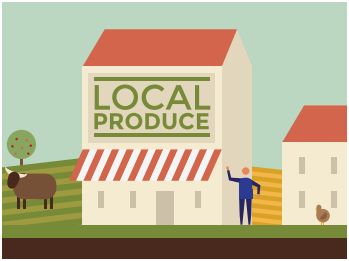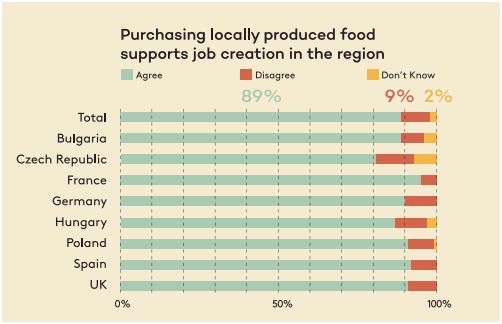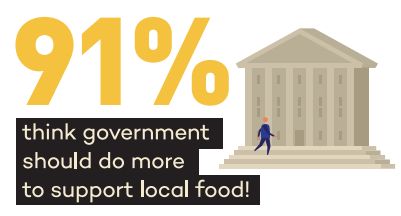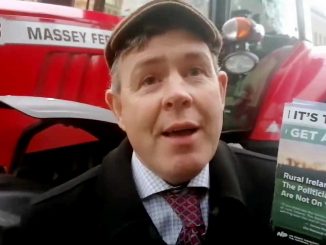
A large majority of EU consumers buy local food to support local jobs, the environment and for a better diet, but feel that governments do little to support local food. That’s according to an opinion poll conducted by Friends of the Earth Europe, which also found over 90% of respondents thoughts governments did not do enough to support local food initiatives.
The poll was carried out in eight EU countries – Bulgaria, France, Germany, Hungary, Czech, Spain, Poland and the UK, Results were published last week. The poll found that 89% thought local food supported local jobs; 75% thought local food was ‘green’ while 78% thought local food provided balanced diets. 73% of respondents siad it was too difficult to find information about local food; 67% claimed it was hard to find local food nearby.
Speaking about the results of the polling, Stanka Becheva, food campaigner for Friends of the Earth Europe, said: “We currently have an increasingly globalised and industrialised food system that destroys jobs, damages the environment and creates costly food scandals. This poll shows public support for something different, and that politicians need to do a lot more to support sustainably produced local food and to build local food economies. We challenge Agriculture Commissioner Phil Hogan to lead the debate in transforming the food system that puts local and green food with short supply chains at its core. This is a massive win-win case where the public, local food producers, and the environment can all benefit.”
According to the report: “Over the past 50 years, our food system has become both more globalised and more heavily dependent on cheap raw materials, chemical inputs and mechanisation. Big business has moved in, with control of our food increasingly concentrated in a handful of multinational corporations operating throughout the food chain.

The social and environmental impacts are devastating: small scale farmers and food companies worldwide are driven out of business; a collapse in biodiversity and ecosystems; obesity and food poverty are rife; while citizens foot the bill as one food crisis follows another. Meanwhile, as consumers, we find it more and more difficult to know what we are buying, who it has been made by, and where it comes from. Business-as-usual for the food system is no longer an option. There is clearly a need for a fundamental change.”
The report also focused on the failings of the EU’s Common Agriculture Policy – CAP.
“The European Union provides support for farmers through the Common Agricultural Policy (CAP), which makes up around 40% of the total EU budget, and costs around €58 billion a year, funded by EU citizens’ taxes. This money is supposed to fund farmers and activities in rural areas related to farming.
Most of it, however, has been used to support industrial food and farming, with only a small amount, less than one third of the CAP budget, used to support sustainable farming or to help farmers with marketing.
Trade policies and the CAP have so far focused on finding new markets for some products, while less has been done to support initiatives which give farmers who produce sustainably the opportunity to sell their products locally through farmers’ markets, farm shops, or to schools and other public institutions, providing fresh, seasonal, sustainable food.”
Four points for the EU Commission from the report
The European Commission, which coordinates overall EU policy on food and farming, needs to:
1. Lead the debate in the EU on the need to transform the food system to put local economies at its core.
2. Introduce a sustainable food policy to encourage citizens to have more sustainable diets, thereby reducing resource use and helping maintain healthy populations – eating more plants and fresh products, while wasting less food.
3. Changes to health and safety, food hygiene, environmental health, and labelling regulations so that they do not disproportionately affect smaller producers and enterprises.
4. Create stricter enforcement mechanisms fighting abusive practices in the EU’s food supply chain and close the gap between producer prices and retail prices, since workers’ conditions have degraded and smaller-scale farmers are finding themselves increasingly excluded from higher value markets.

Four points for national governments from the report
National governments were granted more leeway than ever before to implement the CAP in a flexible manner. In this context:
1. Make best use of their CAP budgets and spend them supporting local economies through both first and second pillar measures.
2. Shift money from the untargeted direct payments budget to targeted second pillar measures to support organic farming, quality schemes, cooperation and producers groups producing and marketing sustainable food, agri-environment-climate, advisory services and agroecological innovation, in a way that funds only farmers and food enterprises delivering for the environment and people.
3. Fund European Innovation Partnership projects which research local agroecological production and local food economies.
4. Agree spending priorities for their budgets for supporting farm viability, environment and social inclusion, like partnership agreements with the European Commission under the Common Strategic Framework in the longer term.
Local food policies and strategies will be discussed at the upcoming conference in Brussels Arc2020, IFOAM EU EESE and Friends of the Earth Europe are organising for 10th and 11th February. More details, including registration, here.




